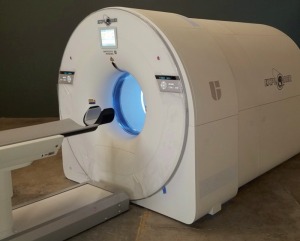Total-body PET/CT is nearing clinical readiness
by Lauren Dubinsky, Senior Reporter | January 04, 2018
CT
Medical Devices
Molecular Imaging
Rad Oncology
PET
X-Ray

The EXPLORER scanner
The University of California, Davis has announced that its total-body PET/CT prototype is now complete and its components are being tested.
An article published in the January edition of The Journal of Nuclear Medicine discusses the potential benefits this technology can bring to research and the clinical setting.
"Clearly it will be quite a lot more expensive than current PET/CT scanners," Dr. Simon Cherry, biomedical engineering professor at UC Davis, told HCB News. "But the throughput also will be a lot higher, as scans can also be acquired more quickly."

 A promising clinical application for the EXPLORER total-body PET/CT is pediatric scanning since it can collect about 40 times more signal than conventional PET. That could reduce a 20-minute exam to 30 seconds, which would make it easier to scan infant and pediatric patients without anesthesia or sedation.
A promising clinical application for the EXPLORER total-body PET/CT is pediatric scanning since it can collect about 40 times more signal than conventional PET. That could reduce a 20-minute exam to 30 seconds, which would make it easier to scan infant and pediatric patients without anesthesia or sedation.
In addition, less radiation dose is administered during a total-body PET/CT exam compared to conventional PET. It's roughly equivalent to that received after a round-trip transatlantic flight.
"Current scanners only cover part of the body, and thus much of the emitted radiation does not strike the detectors," said Cherry. "EXPLORER almost surrounds the patient with detectors and thus can capture much more of the emitted radiation. In fact for a given injected activity, about 40 times more."
That makes it ideal for scanning patients with long-developing diseases like arthritis because they require multiple scans. Researchers can perform interventions and track the disease to better understand it and develop better therapies.
The EXPLORER also has the potential to change the methodological approach to cancer detection and staging. That approach could also be applied to other systemic conditions such as inflammation, vascular disease, sepsis and infectious disease.
Cherry noted that the ultimate commercial cost of a total-body PET/CT scanner is unknown at this time. However, at the World Molecular Imaging Congress conference in September 2016, he said it would be more than $2 million, which is the approximate price of a standard PET/CT.
"There also is the question of whether EXPLORER will add clinical benefit (detection of smaller cancers for example that might currently go unseen)," he added. "It will be some time before all the answers are known, but initially, we will see this technology first in just some of the large medical centers where it will be evaluated."
Cherry and his team expected the EXPLORER to be ready for clinical use by the end of next year if the FDA approval process goes smoothly.
An article published in the January edition of The Journal of Nuclear Medicine discusses the potential benefits this technology can bring to research and the clinical setting.
"Clearly it will be quite a lot more expensive than current PET/CT scanners," Dr. Simon Cherry, biomedical engineering professor at UC Davis, told HCB News. "But the throughput also will be a lot higher, as scans can also be acquired more quickly."
Your Trusted Source for Sony Medical Displays, Printers & More!
Ampronix, a Top Master Distributor for Sony Medical, provides Sales, Service & Exchanges for Sony Surgical Displays, Printers, & More. Rely on Us for Expert Support Tailored to Your Needs. Email info@ampronix.com or Call 949-273-8000 for Premier Pricing.

In addition, less radiation dose is administered during a total-body PET/CT exam compared to conventional PET. It's roughly equivalent to that received after a round-trip transatlantic flight.
"Current scanners only cover part of the body, and thus much of the emitted radiation does not strike the detectors," said Cherry. "EXPLORER almost surrounds the patient with detectors and thus can capture much more of the emitted radiation. In fact for a given injected activity, about 40 times more."
That makes it ideal for scanning patients with long-developing diseases like arthritis because they require multiple scans. Researchers can perform interventions and track the disease to better understand it and develop better therapies.
The EXPLORER also has the potential to change the methodological approach to cancer detection and staging. That approach could also be applied to other systemic conditions such as inflammation, vascular disease, sepsis and infectious disease.
Cherry noted that the ultimate commercial cost of a total-body PET/CT scanner is unknown at this time. However, at the World Molecular Imaging Congress conference in September 2016, he said it would be more than $2 million, which is the approximate price of a standard PET/CT.
"There also is the question of whether EXPLORER will add clinical benefit (detection of smaller cancers for example that might currently go unseen)," he added. "It will be some time before all the answers are known, but initially, we will see this technology first in just some of the large medical centers where it will be evaluated."
Cherry and his team expected the EXPLORER to be ready for clinical use by the end of next year if the FDA approval process goes smoothly.
You Must Be Logged In To Post A CommentRegisterRegistration is Free and Easy. Enjoy the benefits of The World's Leading New & Used Medical Equipment Marketplace. Register Now! |
|










